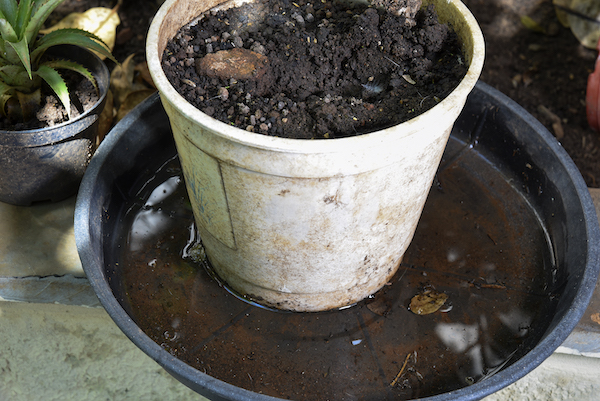As the weather starts to get warmer and we begin spending more time enjoying the outdoors, we are quickly reminded of the pesky guests that no one invited to the party—mosquitoes. While these summertime buzzkills are an annoyance that many of us associate with Southern Ontario summers, certain mosquito species can be more than just a nuisance as they may carry West Nile virus which they can transmit to animals and humans.

How does Public Health help control mosquitoes?
At the beginning of each spring and running into fall, Public Health conducts an annual mosquito larvicide program to reduce mosquito populations known to carry West Nile virus. Trained technicians apply larvicide by hand on municipally-owned property in Wellington and Dufferin Counties where larvae of West Nile Virus-carrying mosquito species have been identified. Mosquitoes prefer to lay their eggs in standing water, so larvicide is applied to larvae breeding on municipal property where standing water cannot be eliminated or is more difficult to control. This includes:
- roadside ditches
- temporary pools
- sewage lagoons
- storm-water retention ponds
- areas of standing water
- municipal catch basins
- You may even spot a technician treating an area in your neighbourhood.
What’s a catch basin?

Catch basins are the entry points to the public sewer system. They are typically built into roadside curbs with grated metal covers but may be installed anywhere water can accumulate and become troublesome. They collect and redirect surface run-off and household wastewater to the sewer system and tend to retain a small amount of water in their bases for extended periods of time which can become breeding areas for the mosquito species associated with West Nile virus.
What is West Nile virus?
West Nile virus is most commonly spread to humans by bites from infected mosquitoes and can cause an infection called West Nile fever. When infected, some people will experience flu-like symptoms. In extremely rare cases there is the potential of inflammation of the brain and spinal column which may result in permanent disability or death. Adults over the age of 50 are most at risk of serious health effects.
Climate change is resulting in rising temperatures and longer summers. That means instances of diseases like West Nile virus and Lyme disease from blood-feeding pests such mosquitos and ticks are expected to increase.
How can I protect myself and my family from mosquitoes?

There are many ways that you can help reduce the mosquito population on your property and reduce the risk of being bitten.
Reduce the chances of mosquito bites by:
- Wearing light-coloured clothing, including long sleeves and pants
- Using a mosquito repellent with DEET or Icaridin for adults and children over 6 months of age (as recommended by Health Canada)
- Avoiding being outside at dawn and dusk when mosquitoes tend to feed
- Repairing holes in screen doors and windows
Remove freestanding water from your property:
- Drain flowerpots and kiddie pools when not in use, change bird bath water every couple of days, and make sure eavestroughs are kept clear
- Have municipally owned catch basins treated (at no cost)
- Treat decorative ponds, fountains and unused pools with a commercially available mosquito larvicide, such as AquaBac
- Report standing water on private properties
- Report dead birds to the Canadian Wildlife Health Cooperative (CWHC) for testing.

If you have a municipally owned catch basin on your property, you can request to have it treated at no cost to you. To request treatment, complete and submit a waiver form as soon as possible in the spring. If your catch basin was treated last summer, you will receive a letter and waiver form for re-treatment ahead of the summer season.
To report standing water on private properties in Wellington or Dufferin County, including ponds and unmaintained swimming pools, call 1-800-265-7293 ext. 4753 to speak to a public health inspector. Or, if you live in Guelph, call the Property Standards Inspection Department at 519-837-5615 ext. 2526 instead.
Enjoying time outdoors with friends and family is one of the best parts of spring and summer. By taking small steps to reduce the mosquito population on your property and preventing bites, you can enjoy your summer gatherings with only those on your guest list.
